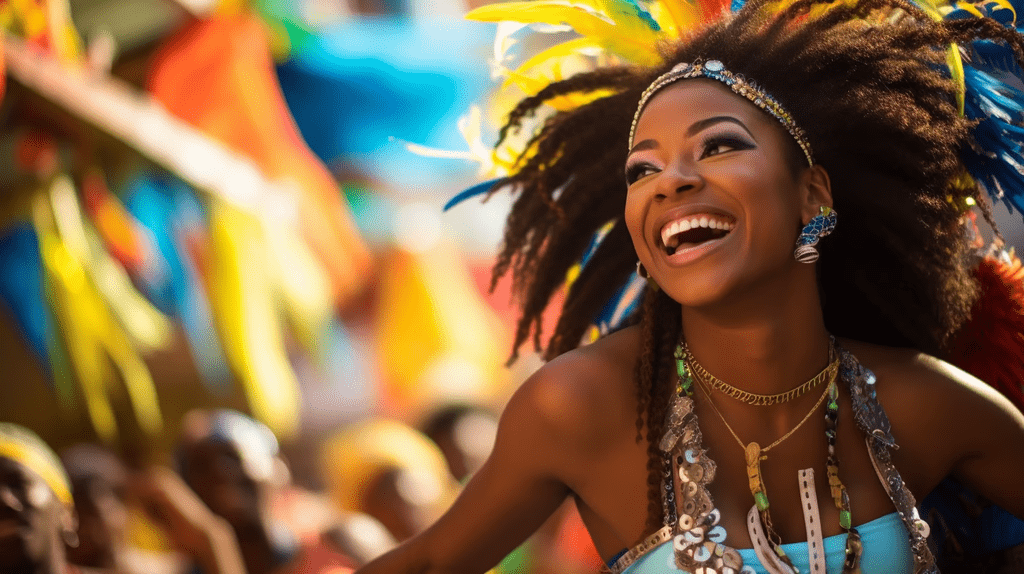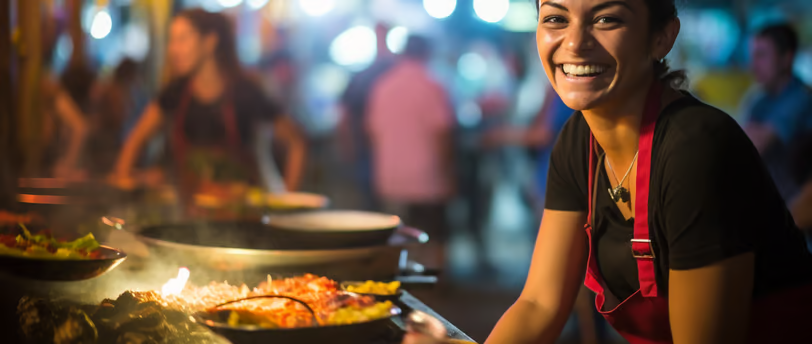
Rio de Janeiro,
Brazil, is a city known for its vibrant street culture. The energy and excitement that permeate the city can be experienced firsthand through its local festivals and feasts. These events not only showcase Rio's rich cultural heritage but also provide an opportunity for locals and visitors alike to immerse themselves in the lively atmosphere of the streets. In this article, we will explore the various aspects of Rio's street culture and highlight some of the major festivals that make this city truly come alive.
Understanding Rio's Street Culture
Before delving into the world of festivals and feasts, it is important to understand the role they play in Rio's social life. Street festivals serve as a way for the community to come together and celebrate shared traditions and customs. These events provide an outlet for creativity, self-expression, and cultural exchange. They are a testament to the vibrancy and diversity that make Rio such a unique city.
The Role of Festivals and Feasts in Rio's Social Life
For the people of Rio, festivals and feasts are more than just an excuse to have fun. They are an integral part of the social fabric of the city. These events bring together people from different walks of life, fostering a sense of unity and belonging. They provide a platform for artists, musicians, and performers to showcase their talents, keeping the cultural traditions alive for future generations.
Imagine walking down the streets of Rio during one of these festivals. The energy is palpable as the sound of samba music fills the air. Colorful costumes and elaborate floats pass by, captivating the eyes of both locals and tourists. The streets are alive with laughter, dance, and the aroma of delicious street food. It is a celebration of life, a moment where the entire city comes alive in a joyous display of culture and community.
One of the most famous festivals in Rio is Carnival, a grand spectacle that takes place annually. During Carnival, the streets become a stage for elaborate parades featuring samba schools, each competing to put on the most dazzling performance. Months of preparation go into creating the intricate costumes and choreography, with participants pouring their hearts and souls into their presentations. The result is a breathtaking display of talent and creativity that leaves spectators in awe.
Rio's street festivals have a deep historical significance that dates back hundreds of years. Many of these events originated as religious celebrations brought to Brazil by Portuguese colonizers. Over time, they have evolved to incorporate elements of African and indigenous culture, resulting in a unique fusion of traditions. Understanding the historical context of these festivals adds depth and meaning to the experience.
One such festival is Festa Junina, a celebration that takes place in June and is deeply rooted in Brazilian folklore. Originally a Catholic feast dedicated to Saint John the Baptist, Festa Junina has transformed into a lively event that showcases the rich cultural heritage of the country. During this festival, the streets are adorned with colorful decorations, and people dress up in traditional attire, such as straw hats and checkered shirts. There are dance performances, games, and, of course, plenty of traditional food and drinks to enjoy.
Another significant festival is the Lavagem do Bonfim, which pays homage to the Senhor do Bonfim, a Catholic saint. This festival combines elements of African and Catholic traditions and is celebrated with a grand procession through the streets of Rio. Participants dress in white and carry flowers, washing the steps of the Bonfim Church as a symbol of purification and renewal. The Lavagem do Bonfim is a powerful example of how Rio's street festivals have evolved to embrace diverse cultural influences.
As you can see, Rio's street culture is a tapestry woven with history, tradition, and a spirit of celebration. The festivals and feasts that take place in the city are not merely events; they are an essential part of Rio's identity. They bring people together, ignite a sense of pride, and showcase the incredible diversity that makes Rio such a vibrant and captivating place.
The Historical Significance of Rio's Street Festivals
One such festival is Festa Junina, a celebration that takes place in June and is deeply rooted in Brazilian folklore. Originally a Catholic feast dedicated to Saint John the Baptist, Festa Junina has transformed into a lively event that showcases the rich cultural heritage of the country. During this festival, the streets are adorned with colorful decorations, and people dress up in traditional attire, such as straw hats and checkered shirts. There are dance performances, games, and, of course, plenty of traditional food and drinks to enjoy.
Another significant festival is the Lavagem do Bonfim, which pays homage to the Senhor do Bonfim, a Catholic saint. This festival combines elements of African and Catholic traditions and is celebrated with a grand procession through the streets of Rio. Participants dress in white and carry flowers, washing the steps of the Bonfim Church as a symbol of purification and renewal. The Lavagem do Bonfim is a powerful example of how Rio's street festivals have evolved to embrace diverse cultural influences.
As you can see, Rio's street culture is a tapestry woven with history, tradition, and a spirit of celebration. The festivals and feasts that take place in the city are not merely events; they are an essential part of Rio's identity. They bring people together, ignite a sense of pride, and showcase the incredible diversity that makes Rio such a vibrant and captivating place.
Exploring the Major Festivals in Rio
With so many festivals to choose from, it can be overwhelming to decide which ones to attend. Here are three of Rio's most iconic festivals that are sure to leave a lasting impression:
Carnival is undoubtedly the most famous festival in Rio. Held annually in February, it attracts millions of visitors from around the world. The streets come alive with colorful parades, samba dancers, and elaborate costumes. Carnival is a true celebration of life, love, and music, and experiencing it firsthand is an unforgettable experience.
Festa Junina is a festival that celebrates the rural traditions of Brazil. Held throughout the month of June, it features traditional food, music, and dances. The streets of Rio are adorned with colorful decorations, and locals dress up in traditional rural attire. Festa Junina provides a glimpse into the rich agricultural heritage of Brazil and is a great opportunity to try traditional dishes such as canjica and pé-de-moleque.
Carnival: The Biggest Street Party on Earth
Carnival is undoubtedly the most famous festival in Rio. Held annually in February, it attracts millions of visitors from around the world. The streets come alive with colorful parades, samba dancers, and elaborate costumes. Carnival is a true celebration of life, love, and music, and experiencing it firsthand is an unforgettable experience.
Festa Junina: A Traditional Brazilian Feast
Festa Junina is a festival that celebrates the rural traditions of Brazil. Held throughout the month of June, it features traditional food, music, and dances. The streets of Rio are adorned with colorful decorations, and locals dress up in traditional rural attire. Festa Junina provides a glimpse into the rich agricultural heritage of Brazil and is a great opportunity to try traditional dishes such as canjica and pé-de-moleque. New Year's Eve: A Celebration Like No Other
Rio's New Year's Eve celebration is one of the most spectacular in the world. As the clock strikes midnight, millions of people gather on the city's famous Copacabana Beach to welcome the new year. The sky is illuminated with a breathtaking fireworks display, and the atmosphere is filled with joy and anticipation. It is a time to reflect on the past year and make wishes for the future.

The Food Culture at Rio's Street Festivals
No festival experience is complete without indulging in the delicious street food that Rio has to offer. Here are a few staples that should not be missed:
Street Food Staples: What to Try
One of the most iconic street foods in Rio is the feijoada, a traditional Brazilian black bean stew served with rice, farofa, and collard greens. Another must-try is the pastel, a deep-fried pastry filled with various savory ingredients such as cheese, meat, or shrimp. For those with a sweet tooth, brigadeiros, traditional Brazilian chocolate truffles, are a popular choice.
The Influence of African and Portuguese Cuisine
Rio's street food is a reflection of the city's diverse cultural heritage. African and Portuguese influences can be seen in dishes such as acarajé, a deep-fried ball of black-eyed pea dough filled with shrimp and served with spicy sauce. Another popular African-inspired dish is moqueca, a flavorful fish stew cooked with coconut milk and dendê oil. These culinary delights are a testament to the melting pot of cultures that make Rio's food scene so unique.
The Art and Performances at Rio's Festivals
From lively music to captivating performances, Rio's festivals are a feast for the senses. Here are two forms of art and performance that are integral to the festival experience:
Samba: The Heartbeat of Rio's Festivals
Samba is the soul of Rio's festivals. Its infectious rhythm and energetic dance moves capture the essence of the city. Samba schools, which are community organizations dedicated to preserving the art of samba, play a central role in Carnival parades. Thousands of dancers adorned with dazzling costumes take to the streets, creating a spectacle that is truly mesmerizing.
Capoeira and Other Traditional Performances
In addition to samba, Rio's festivals also feature other traditional performances that showcase the city's rich cultural heritage. Capoeira, a martial art that combines elements of dance and acrobatics, is a highlight of many festivals. It is a form of self-expression and storytelling that originated among African slaves in Brazil. Other traditional performances include folk dances, live music, and theater, all of which add depth and diversity to the festival experience.
Planning Your Visit to Rio's Festivals
If you are planning to visit Rio and experience its vibrant street culture, here are a few tips to help you make the most of your trip:
Choosing the Right Festival for You
Rio offers a wide range of festivals throughout the year, each with its own unique atmosphere and traditions. Research the different festivals and choose one that aligns with your interests and preferences. Whether you are a fan of music, food, or cultural performances, there is a festival in Rio that will cater to your tastes.
Tips for Navigating Rio's Street Festivals Safely
As with any crowded event, it is important to take precautions to ensure your safety. Stay aware of your surroundings, avoid carrying valuables, and be mindful of pickpockets. It is also a good idea to familiarize yourself with the neighborhood where the festival is taking place and plan your transportation accordingly. Consider staying in a hotel or rental within walking distance of the festival to minimize travel time and maximize your festival experience.
In conclusion, Rio's festivals and feasts offer a unique glimpse into the city's vibrant street culture. From the electrifying energy of Carnival to the traditional music and art performances, there is something for everyone to enjoy. So pack your bags, immerse yourself in the lively atmosphere, and experience the magic of Rio's festivals firsthand. Whether you are a seasoned traveler or a first-time visitor, these events are sure to leave you with memories that will last a lifetime. So join in the celebration, dance to the rhythm of the samba, and lose yourself in the vibrant street culture of Rio de Janeiro.
Start planning your trip now and get ready for an experience like no other!

